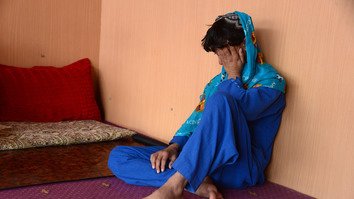KABUL -- Afghanistan's Wolesi Jirga (lower chamber of parliament) has finally approved the Law on Protection of Child Rights after years of debate on determining the childhood age.
The law passed by majority vote on Monday (December 9) comprises 16 chapters and 108 articles. Article 3 defines a child as "a person who has not completed the age of 18".
The bill still requires passage by the upper chamber (Meshrano Jirga) and signature by President Ashraf Ghani to become law.
"The Child Protection Law made it to the Wolesi Jirga agenda three times in the past two years, but it was not approved because a minority of house representatives opposed it," said Shinkai Karokhel, a representative of Kabul Province in the Wolesi Jirga.
"But fortunately, the Wolesi Jirga approved the law two days ago with an outright majority vote," she said Wednesday (December 11).
"This law protects children in various areas," Karokhel said. "Providing education opportunities, fairly investigating violations against children, paying attention to children's physical and mental wellbeing and defining government and family responsibilities toward children are among areas the law covers."
"Previously, violence against children was not defined, but this law has specified violence against children... and if anyone does so, he [or she] will face prosecution," she said.
A number of Wolesi Jirga members protested setting the age of adulthood as 18, asserting that Islam determines the age of an adult by the signs of puberty.
This claim is baseless, said Karokhel -- and the majority of lawmakers.
"The Child Protection Law is not against Islam, and those who oppose the passing of the law do not know anything about the law or Islam," she said.
Protecting children's rights
"The Child Protection Law has comprehensively protected children's rights," said Wahidullah Farzayee, a member of the Lawyers' Association of Afghanistan.
The law guarantees the fundamental rights of children, including the rights to education and health care, among others, he said.
"Providing a safe environment for children, preventing discrimination against children, improving children's lives and preventing child abuse are among other goals of the law," he said.
The law clarifies the government's obligations to ensure children's rights as well as parents' responsibilities for protecting children.
Of note, the law addresses child labour, sexual abuse and exploitation, kidnapping and trafficking, bacha bazi, aid to children with disabilities and to orphans, and underage marriage.
The presidential palace welcomed the Wolesi Jirga's approval of the act.
"The government of Afghanistan considers the action of MPs to reduce violence against children as effective and is committed to its implementation through government agencies," the presidency said in a statement.
Ending children's misery
Once the law is enacted, it will reduce violence against children, children's rights activists say.
"Our country's children are the most vulnerable part of our society, and had we continued to lack this law, children's vulnerability and violence against them would have grown as time went on," said Abdul Baqi Samandar, a children's rights activist in Kabul.
"With the passing of this law, Afghan children will gain their rights, and when it is implemented, violence against children will also drop," he said.
Three million children are engaged in hard labour in Afghanistan, according to Samandar, and in some cases, they are harassed and abused.
The new law will protect children from hard labour and prevent child abuse, he said.
"Afghan children have been suffering from a great deal of misery, and we hope that the law brings relief to our children's pain," he said.
The passing of the Child Protection Law is an important step for Afghanistan, which is a member of international conventions on children's rights, Samandar said.
"As a children's rights advocate and activist, I welcome the passing of the law by parliament," he said.
"Unfortunately, the Taliban have also abused children in a variety of ways for 20 years," Samandar said. "They have recruited them and trained them to commit suicide bombings."
"I hope that the law will also be able to prevent the Taliban from abusing children," he said.
Raising awareness
Hard labour, forced marriages and sexual assault are among the myriad threats children face, said Abdullah Hashemi, former director of Afghanistan Orphanages.
"The passing of this law is a practical step to support the true rights of children, and with the implementation of this law, threats and incidents of violence against children will decline," he said.
"This law will raise citizens' awareness of children's rights," said Allah Dad, 28, a student at Kabul University. "When public awareness improves, it will not only reduce violence against children but also create a safe living environment for children."
"The government should raise public awareness through the media about the benefits of this law," he said, adding that illiteracy is a barrier to many families' understanding of children's rights.

![Afghan child labourers take a break to eat soup after collecting recyclable materials from the garbage in Mazar-e-Sharif on August 28. [Farshad Usyan/AFP]](/cnmi_st/images/2019/12/13/21410-000_1ju7p5-585_329.jpg)







i hope it can be implemented.
Reply1 Comment